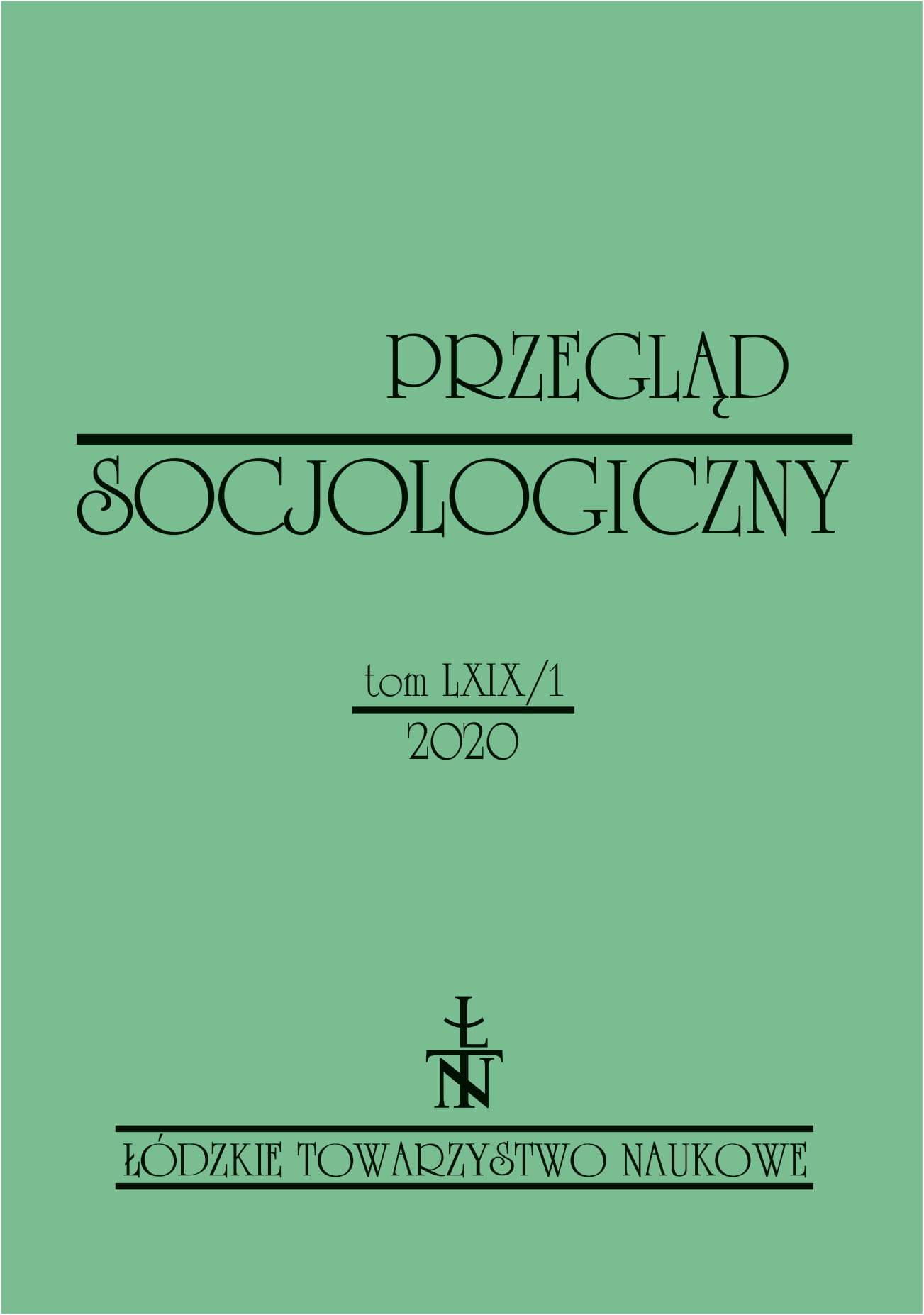Women and the institutionalisation and de-institutionalisation of the family
DOI:
https://doi.org/10.26485/PS/2020/69.1/1Keywords:
family modernisation, institution, deinstitutionalisation, womenAbstract
The changes that the modern family is subjected to, have been discussed in the context of two competing positions: de-institutionalisation and the constancy of institutional family models. Both models focused on the functioning of women in their families. Previous works have shown that women can be considered as the beneficiaries of modernisation processes. These benefits primarily refer to the acquisition of the right to pursue autonomous life scenarios. However, women do not take full advantage of these opportunities. When making decisions related to the family, women are driven by collectivist ideals in which the well-being of their partner and relatives is more important than their own. As a result, modern families maintain and continue to produce traditional gender inequalities in a new institutionalised form.
References
Albertini Marco, Martin Kohli, Claudia Vogel. 2007. “Intergenerational transfers of time and money in European families: Common patterns different regimes?”. Journal of European Social Policy 17(4): 319–334.
Amato Paul R. 2004. “Tension between institutional and individual views of marriage”. Journal of Marriage and the Family 66(4): 959–965.
Beck Ulrich. 2002. Społeczeństwo ryzyka. W drodze do innej nowoczesności. Warszawa: Wydawnictwo Naukowe Scholar.
Beck-Gernsheim Elizabeth. 2002. Reinventing the family: In search of new lifestyles. Cambridge: Polity Press.
Beck Ulrich, Elizabeth Beck-Gernsheim. 2002. Individualization: Institutionalized individualism and its social and political consequences. London: Sage.
Canetto Silvia S. 1996. “What is a normal family? Common assumptions and current evidence”. Journal of Primary Prevention 17: 31–46.
Cherlin Andrew J. 2004. “The deinstitutionalization of American marriage”. Journal of Marriage and Family 66(4): 848–861.
Cherlin Andrew J. 2013. Public and private families: An introduction. New York: McGraw-Hill.
Coontz Stephanie. 2005. Marriage, a history: From obedience to intimacy or how love conquered marriage. London: Viking Penguin.
Davies Jon (ed.), Brigitte Berger, Allan Carlson. 1993. The family: Is it just another lifestyle choice? London: Institute of Economic Affairs. http://www.socresonline.org.uk/16/4/13.html [dostęp: 11.12.2018].
Douglas Mary. 1987. How institutions think. London: Routledge.
Duncan Simon, Rosalind Edwards, Pam Alldred, Tracy Reynolds. 2003. “Motherhood, paid work and partnering: Values and theories”. Work, Employment and Society 17(2): 309–330.
Duncan Simon. 2011. “Personal life, pragmatism and bricolage”. Sociological Research Online 4(16): 1–12. http://www.socresonline.org.uk/16/4/13.html [dostęp: 14.01.2019].
Edwards Rosalind, Jane Ribbens McCarthy, Val Gillies. 2012. “The politics of concepts: Family and its (putative) replacements”. British Journal of Sociology 63(4): 730–746.
Esping-Andersen Gosta. 1999. Social foundations of postindustrial economies. Oxford: Oxford University Press.
Finch Janet. 2007. “Displaying families”. Sociology 41(1): 65–81.
Gabb Jacqui. 2008. Researching intimacy in families. London: Palgrave Macmillan.
Giddens Anthony. 1998. The third way: The renewal of social democracy. Cambridge: Polity Press.
Giddens Anthony. 2008. Socjologia. Warszawa: Wydawnictwo Naukowe PWN.
Gilding Michael. 2010. “Reflexivity over and above convention: The new orthodoxy in the sociology of personal life, formerly sociology of the family”. British Journal of Sociology 61(4): 757–777.
Jamieson Lynn. 2005. Boundaries of intimacy. In: Families in society: Boundaries and relationships, L. McKie, S. Cunningham-Burley (eds.), 189–206. Bristol: Policy Press.
Künemund Harald. 2006. “Changing welfare states and the ‘sandwich generation’: Increasing burden for the next generation?”. International Journal of Ageing and Later Life 1(2): 11–29.
Lewis Jane. 2001. The end of marriage? Individualism and intimate relations. Cheltenham: Edward Elgar.
Logan John R., Glenna D. Spitze. 1997. Family ties: Enduring relations between parents and their grown children. Philadelphia: Temple University Press. https://muse.jhu.edu/ [dostęp: 20.12.2018].
Morgan David H.G. 1996. Family connections: An introduction to family studies. Cambridge: Polity Press.
Morgan David H.G. 2011. “Locating ‘family practices’”. Sociological Research Online 16(4). https://www.researchgate.net/publication/227599568 [dostęp: 6.12.2018].
Noack Turid, Kenneth A. Wiik. 2008. “Women’s choice of surname upon marriage in Norway”. Journal of Marriage and Family 70(2): 507–5018.
Orbuch Terri L., Jose A. Bauermeister, Edna Brown, Brandyn D. McKinley. 2013. “Early family ties and marital stability over 16 years: The context of race and gender”. Family Relations 62(2) 255–268.
Pahl Ray, Liz Spencer. 2004. “Personal communities: Not simply families of ‘fate’ or ‘choice’”. Current Sociology 52(2): 199–221.
Perälä-Littunen Satu, Marja Leena Böök. 2012. “The beginning and end of parental responsibility – finnish parents’ views”. Journal of Comparative Family Studies 43(6): 925–941.
Popenoe David. 1993. “American family decline, 1960–1990: A review and appraisal”. Journal of Marriage and Family 55(3): 527–542.
Ribbens McCarthy Jane. 2012. “The powerful relational language of ‘family’: Togetherness, belonging and personhood”. Sociological Review 60(1): 68–90.
Sikorska Małgorzata. 2018. „Teorie praktyk jako alternatywa dla badań nad rodziną prowadzonych w Polsce”. Studia Socjologiczne 2(229): 31–63.
Sikorska Małgorzata. 2010. Praktyki rodzinne i rodzicielskie we współczesnej Polsce – rekonstrukcja codzienności. Warszawa: Wydawnictwo Naukowe Scholar.
Smart Carol. 2007. Personal life: New directions in sociological thinking. Cambridge: Polity Press.
Smart Carol, Beccy Shipman. 2005. “Visions in monochrome: Families, marriage and the individualization thesis”. The British Journal of Sociology 55(4): 491–509.
Sprey Jetse. 2009. “Institutionalization of the family and marriage: Questioning their cognitive and relational realities”. Journal of Family Theory & Review 1(1): 4–19.
Vogler Carolyn. 2005. “Cohabiting couples: rethinking money in the household at the beginning of the twenty first century”. Sociological Review 53(1): 1–29.
Szlendak Tomasz. 2010. Socjologia rodziny. Ewolucja, historia zróżnicowanie. Warszawa: Wydawnictwo Naukowe PWN.
Wehner Cecilie, Peter Abrahamson. 2004. Individualization of family life and family discourses, ESPAnet conference. Oxford, September 9–11 2004. https://www.researchgate.net/publication/242452901 [dostęp: 12.01.2019].
White James, David Klein. 2008. Family theories. London: Sage Publication.



